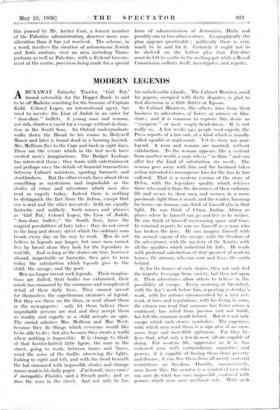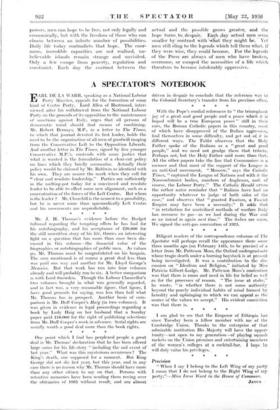MODERN LEGENDS
ARUNAWAY Grimsby Trawler, ' Girl Pat,' bound ostensibly for the Dogger Bank, is said to be off Madeira searching for the treasure of Captain Kidd. Colonel Lopez, an international agent, has tried to involve the Lion of Judah in an order for " dum-dum " bullets. A young man and woman, not rich, charter a yacht for a voyage without destina- tion in the South Seas. An Oxford undergraduate walks down the Broad to his rooms in Holy-well Manor and later is .found, dead in a burning hayrick. Mrs.. Mollison flies to.the Cape and back in eight days. These are the events which in the last week have .excited men's imaginations. The Budget Leakage has interested them ; they learn with entertainment and perhaps envy, the details of financial transactions between Cabinet ministers, sporting baronets and stockbrokers. But the other events have about them something as mysterious and improbable as the stories of crime and adventure which men also read so eagerly today. Indeed there is nothing to distinguish the fact from the fiction, except that one is. real and the other invented : both are equally fantastic and unlikely. Such names and phrases as 'Girl Pat,' Colonel Lopez, the Lion of Judah, "dum-dum bullets," the South Seas, have the magical possibilities of fairy tales : they do not occur in thelOng and dreary street which the ordinary man tread's every day on his way to work. Men do not belieVe in legends any longer, but since men cannot live by bread alone they look for the legendary in real life. And so long as the stories are true, however absurd, improbable or fantastic, they give to men today the satisfaction which legends give to th'e child, the savage, and the poet.
Men no longer invent such legends. Their imagina- tions are dulled, their bodies too exhausted, their minds too crammed by the enormous and complicated detail of their daily lives. They cannot invent for themselves the superhuman creatures of legend. But they see them on the films, or read about them in the newspapers ; only let them belieVe these improbable persons are real and they accept them as readily and eagerly as a child accepts an ogre. The crowd admires Mrs. MollisOn and Mae West, because they do things which everyone would like to be able to do ; but also because they create a world where nothing is impossible. It is strange to think of that bowler-hatted little figure, the man in the street, going to work, between trams and 'buses, amid the noise of the traffic, observing the lights, looking to right and left, and with the head beneath the hat crammed with impossible stories and strange names read in his daily paper. J'ai heuriA savez-vous d' incroyables Florides, said a French poet ; and so does the man in the street. And not only he has his unbelievable islands. The Cabinet Minister, amid his papers, occupied with dusty disputes, is glad to find diversion in a little flutter at Epsom.
So Cabinet Ministers, like others, turn from their business to adventures, of horses or airmen or film- stars ; and it is common to reprove this desire as " escapism " or mere empty-headedness. It is not really so. A few weeks ago, people read eagerly the Press reports of a law-suit, of a kind which is usually called squalid or unpleasant. Yet its story was pure legend. A man and woman are married, without satisfaction. To the woman appears, like a visitant from another world, a man who is " in films " and can offer her the kind of satisfaction she needs. The woman goes away with him and the husband takes action intended to recompense him for the loss he has suffered. That is a modern version of the story of Helen, with the legendary quality which releases those who read it from the dreariness of their ordinary life and seems to show men and women in a more passionate light than is usual; and the reader, knowing his heroes are human, can think of himself also in that light." He can think of China, Arabia, Africa as places where he himself can go and live as he wishes. He can think of himself overcoming space and time. In criminal reports he can sec himself as a man who has broken the laws. He can imagine himself with the animal vigour of the savage, with the freedom of the adventurer, wit h the mystery of the Asiatic, with all the qualities which industrial life kills. He reads with profound satisfaction of that greatest of modern heroes, the airman, who can soar and leave the earth behind.
As for the heroes of such stories, they not only feel the impulse to escape from society, but they act upon it. Their adventures allow others to believe in the possibility of escape. Every morning at breakfast, with the day's work before him, repeating yesterday's work, with his actions circumscribed by a vast net- work of laws and regulations, with his living to earn, the citizen can read that someone has flown across a continent, has acted from passion and not habit, has left the common world behind. But it is not only escape which such stories symbolise. The eagerness with which men read them is a sign also of an enor- mous hope and incredible optimism. For they be- lieve that, what only a few do now, all are capable of doing. For modern life, oppressive as it is, has endowed men with extraordinary capacities and powers, it is capable of freeing them from poverty and disease, it can free them from all merely material restrictions on freedom. Dumbly, uncoll,,eionsly, men know this, the aviator is a symbol of 111(11 who can now do what was once impossible, endowed with powers which were once mythical only. With such powers, men can hope to be free, not only legally and economically, but with the freedom of those who can chocise between an infinite number of possibilities. Daily life today contradicts that hope. The enor- mous, incredible capacities are not realised, un- believable islands remain strange and unvisited. Only a few escape from poverty, regulation and constraint. Each day the contrast between the actual and the possible grows greater, and the hope turns to ,despair. Each flay actual men seem smaller by contrast with4fiat" they might Le. Yet men still cling to the legends which tell them what, if they were wise, they could become. For the legends of the Press are always of men who have broken, overcome, or escaped. the necessities of a life which threatens to become intolerably oppressive.



















































 Previous page
Previous page